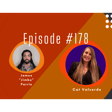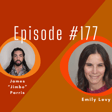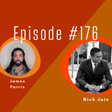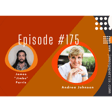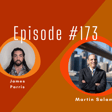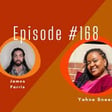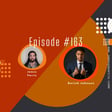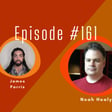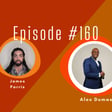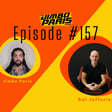Become a Creator today!Start creating today - Share your story with the world!
Start for free
00:00:00
00:00:01

Jimbo Edition #174- Alan Lazaros
Alan Lazaros is the CEO of Next Level University, Global Top 100 Podcast, 1,700+ Episodes, 170+ Countries, 1M+ Listens, $1M+ Revenue, Computer Engineer with MBA, Business Coach.
Website:https://www.nextleveluniverse.com/
Watch more on jamesgaparris.com
Transcript
Introduction and Alan's Podcast Journey
00:00:00
Speaker
All right. Hello, everyone. Welcome back to the show. This is the James Paris edition. And today we have a very special guest. This is Alan. Alan, it's great to see you. Can you kind of give me a gist of who you are, what you're about, and also what your message is?
00:00:17
Speaker
Yeah, so first of all, thank you so much for having me. Like I had mentioned, it's nine years ago, I started listening to podcasts and going on different platforms like this, and I never take it lightly to have the opportunity to speak into someone else's life. So anyone who is listening or watching on the other end, thank you for your time and attention. I do not take that lightly. I will try to ah honor that as much as possible. I think
Alan's Role and Life-Changing Experiences
00:00:41
Speaker
it's one of the most valuable assets we have is our attention.
00:00:44
Speaker
So who am I now? I'm the CEO of Next Level University. I run a 21 person team at Next Level University. That's our company and our podcast. And we have 21 departments. We do a whole bunch of different things all around holistic self-improvement.
00:01:00
Speaker
And so nine years ago, I was 26 years old and I had what I referred to as my quarter life crisis where I got in a car accident. And when I was two years old, my father actually passed away in a car accident when he was 28. And so when I was 26, I almost had the same thing happen to me. And it really turned my life around. It got me to question my life. It was my existential quarter life crisis where I was filled with regret about my choices and The best way I can describe it in the shortest form is before 26, I was very achievement oriented and I was very improvement oriented, but not self improvement oriented, not personal growth, not personal development. And so after that I flipped the script and the best way I can describe it is before 26, I was successful, but unfulfilled. Then I actually flipped the script and went all in on fulfillment and then ended up fulfilled and not successful. And now I'm seven years later.
00:01:56
Speaker
after starting next level university actually i can authentically say that i'm fulfilled and successful and so i often joke playfully but i say being successful without fulfillment is it it sucks ah being fulfilled without success also sucks it's just not as much and i think in the 21st century we all have an opportunity to be our own unique flavor of successful and fulfilled and so that's really what my message is excellent and What did it sort of feel like to go through that at such a young age? And
Family Background and Cultural Influences
00:02:31
Speaker
how did you get through that experience? Did you sort of have to take the mantle almost as the father at a very early age? Because I've heard that's sort of what happens in those types of situations. And it it must have been a really, really tough experience for him.
00:02:51
Speaker
So when you're growing up, you don't ah really know any different. So it was definitely tough for sure. I had a stepfather from age three to 14. My real last name is actually McCorkle. I never used to talk about this publicly, but now I finally have the courage to just own my whole story. and so From 3 to 14 I had a stepfather and I took his last name at age 7 for for the the Greek community ah people that they hear the name Lazarus and they go, you blonde hair, blue eyes, I don't understand you know why is your last name Lazarus, that kind of thing. but So my my real last name is actually McCorkle.
00:03:30
Speaker
my dad's name was John McCorkle and he had a big Irish Catholic family. So my mom and my grand father and grandmother had a lot of kids. So they had Jim, Joe, John, Jane, Joe, Jeanette, six J's. And to answer your original question about the man of the house thing, when my stepfather left at 14,
00:03:52
Speaker
We kind of didn't talk a ton to the McCorkles because we were being the Lazarus's. And then when he left, he not only took 90% of the income with him, but he also took his entire extended family with him too. And then at that same time, my mom actually got in a fight with her sister and we sort of got ostracized from her side of the family too. So by the time I'm 14 years old, in some ways I kind of lost three families.
00:04:13
Speaker
Fortunately the McCorkles my birth father's side really took us back with open arms but for them I think in some ways it was kind of like seeing a ghost because I look a lot like my dad and Really it was when my stepdad left he got the yacht in the apartment building We got the house and the dog we went from upper middle class doing well Financially with my stepfather because he worked for a company called Agfa doing hospital computers during the late 90s early 2000s And now I, when when he left, I get free lunch at school because our income is so low. My mom trades in her BMW for a Honda. And even
Overcoming Financial Struggles and Aspiration
00:04:53
Speaker
if I do get into my dream college, I don't know if I'm going to be able to afford it because my dream college at the time, WPI, Worcester Polytechnic Institute, it's kind of like a mini MIT was $50,000 a year back then.
00:05:03
Speaker
And for me, that was my dream to be an engineer. And I did end up going, I got in and I got fortunately a lot of financial aid and scholarships. I think in many ways, my trauma response in hindsight to all of this adversity or these challenges, particularly at 14 was just always aim higher, work harder, get smarter. Fortunately, fortunately, and I don't think that that's particularly normal. Uh, and I, I, I partied a lot too. I certainly was not perfect by any means, but for some reason, whenever things got really hard.
00:05:33
Speaker
I always aimed higher, worked harder and got smarter. And that was kind of my, the way I got through it. um When I hear Irish. in Greek, those seem like two extremely polar, very differing sides. And you know that must have been a very interesting situation. So what culture did you actually maybe lean towards or embrace more? Did that culture maybe play a role in a bit more of your success and sort of who you are today?
00:06:08
Speaker
You know, the the Irish Catholic McCorkle background was very different than the Lazarus side of the family. But I think the whole thing more than anything was me figuring out who I am and what I am. And now I'm 35. I often playfully joke. I say I'm hoping to hit puberty at 36. But anyway, so when I didn't start doing therapy until my thirties and in my thirties I started really rewatching the movie of my own life and I've been doing this every year for my entire adult life really but but in therapy that's when it really started to to land in a different way for me and so I highly encourage that I always playfully joke I say guys can't even ask for directions never mind get a therapist right but anyway so so I reflected on my past a ton
00:06:57
Speaker
And I re-watched the movie of my own life. I always use Finding Nemo as an example because I rode my bike to school when I was in middle school to see Finding Nemo back in 2003. And I re-watched that movie on my second date with with my beautiful girlfriend Emilia. And i i it's like re-watching a movie.
00:07:15
Speaker
that you saw as a kid, but now you're an adult, nothing changed in the movie. Something changed in you. Your awareness is higher. You understand the jokes you never understood before. There's actually adult jokes in there that you never got before. And so for me, I've rewatched the movie of my own life from this higher sense of awareness from my 35 year old blends. And it's very, very obvious that I was very lost, but I didn't feel any more or less lost than anyone else.
00:07:41
Speaker
and i
Exploring Self-Discovery and Existential Questions
00:07:42
Speaker
definitely wasn't vulnerable and honest externally with people about my trauma i didn't really know what trauma was i didn't particularly identify as someone who had a ton of trauma even though i very clearly did i I didn't know how much adversity that I had. Now I understand the statistics and there's something called adverse childhood experiences. It's an ACE score, ACE, and it's it's very well researched. And I was, I had a very, very high ACE score, even though when you're a kid, you don't know that.
00:08:13
Speaker
And so it's only later on when you look back and realize that you were kind of lost. And after 26, I just, I just re focused my entire existence on how do I become a better version of myself instead of trying to run away from pain and trauma and achieve significance. I'm going to, I'm going to turn the the mirror inward and really look at who is Alan, who is Alan really? Is he McCork? Was he Lazarus? Is he own his own thing?
00:08:41
Speaker
What am I really like? And what are my real core values? What are my real goals? Who do I really want to be? Am I proud of the man I've become? What would make me proud of the man I've become? So it's it's a whole existential thing. And and for those of you who don't know what an existentialist is, an existentialist is someone who's constantly questioning the point of it all. what's the Why are we here? Why do we exist? And I think the only wrong answer in life is to not ask that question.
00:09:06
Speaker
Why? What is your purpose? What is your calling? What are you passionate about? Who are you? Why are you that way? Was it your past conditioning? Was it natural? Was it a gift? Were you born with it? Nature versus nurture. There's all this stuff that we we need to learn and figure out because what's the difference between a child and an adult, right? The difference between a child and an adult is that the child still has their innocence, but they're naive and ignorant.
00:09:27
Speaker
And an adult is someone who's wise, hopefully, and and more mature. and And we all have to kind of rewatch the movie of our own life to figure out who we really are. And it's this constant duality between, I know who I am, and I don't know who I am. And I'm constantly exploring that and re-centering up on and who i I aspire to be. So I'm just curious, who is a, and what role does alan play in this idea that you mentioned earlier about uh... what is it a holistic self-improvement now that you got it you got it uh... if you've ever heard of the float tank
00:10:10
Speaker
a float tank. It's essentially a place where you go and they're usually a spa type of environment and they put salt in the water to the extent that the density of the water is higher than your body so you float.
00:10:31
Speaker
and they put you in ah what's called a salt tank and they turn off all the lights and they put on meditative music, you're sort of floating, for lack of better phrasing. The best way I can describe it is floating on a on a wet cloud for an hour in the dark by yourself. It's supposed to be a meditative experience. I've done it twice and it is, it's awesome. ah it's It's nothing. I didn't have like a mysterious, mystery, spiritual experience, but I did have a meditative state.
00:10:59
Speaker
And in that meditative state, when all the noise is quiet, because that's what life is, especially in the 21st century, it's so noisy, you rarely sit there for an hour in the dark by yourself and just think and just reflect.
00:11:13
Speaker
And so I have this framework called the learning loop, where it's humble curiosity, which leads to new knowledge, new knowledge leads to new choices, new choices lead to new experiences and new experiences lead to reflection, new reflection. And when you reflect, then you go back to the humble curiosity. And in the float tank, the two different times I did it, I sat there and it for an hour in the dark, floating on a wet cloud, for lack of better phrasing.
00:11:38
Speaker
And I had this this come to me because my my question is existential. What's the point? Why? Who am I and what do I need to do? And both times there was the same thing that came to me, which was all that's ever mattered to you and all that ever will matter to you is self-improvement. And the first time it was personal development, so the label changed. It was personal development. The second time it was self-improvement. And so
Defining Life Purpose and Career Transition
00:12:10
Speaker
I don't know if this is unique to me. I don't know if this is a calling or if this is because I felt insignificant not having a dad and my stepdad leaving or trying to get his love. I don't know exactly why, but for some reason I always loved improvement.
00:12:25
Speaker
I'm a obsessed with getting better at everything. The only difference between before 26 and after 26 is i used to I used to hone it towards crafts like snowboarding and basketball and academics and college and partying and whatever it was though. Be rude even. Bags, yard games. I wanted to get better at everything I do. I adored it.
00:12:45
Speaker
And so the only difference between but pre-26 and post-26 is I now turn that towards self. Instead of improving at Can Jam, which is a yard game, I improve myself, my own skills, my own communication, my own business, my own leadership.
00:13:02
Speaker
And so, who is Alan? The best way I can describe it is i'm I'm someone who is here to maximize his own unique potential and help others do the same. And when I'm doing that, I feel aligned. I feel fulfilled. I'm doing that right now. I'm here to try to help people maximize their own unique potential. And the keyword is unique, by the way.
00:13:23
Speaker
And so goals, dreams and self-improvement, that is just my whole world. And if you have goals and dreams and you want to improve, I, you will, you will benefit from being in my corner. But the truth is, if you don't have goals and dreams and you don't want to improve, I will just be a pain in the butt. And unfortunately I spent too much of my life around people who I was just a pain in the butt to, which really negatively affected my self-worth. Excellent. And so the next question I have is.
00:13:54
Speaker
What is your goal in particular? Does it have something to do with next level university? And I was thinking back to our conversation. You mentioned that university, which you we're planning on going to, which was, um, it was similar to MIT in your eyes. what What happened through that situation? Did it have something to do with this next level university and your goals in particular?
00:14:18
Speaker
So when I was 10 years old, my mom drove past the bottom of the hill. So anyone who went to WPI or graduated from WPI knows that there's, it's it's called the hill and the whole school is kind of on a ah big hill in Worcester, Massachusetts.
00:14:35
Speaker
And at the bottom of the hill, there's the sign WPI. So that's when you're on campus. And I remember driving in my mom's black BMW and I was very young and she said, your uncle Merle is the track and field coach there. And still to this day, the track and field is actually named Norcross field. That's my uncle Merle. Uh, he's since passed away. And I remember my mom saying, you're good at math. Engineers make a lot of money. Engineers are good at math. You should be an engineer.
00:15:05
Speaker
And as a kid, I had two big dreams. I had a bunch of little ones. I want to be an Abercrombie model and I want to be a pro gamer and I want to add a bunch of little ones. But I had two really big ones that were very legit. and And by legit, I mean, I meant to do them like I intended on it. So the two paths.
00:15:24
Speaker
for me that I was contemplating in the early days when I was a kid was, and me and my best friend, we were really into Microsoft and Apple. It's like Bill Gates, Steve Jobs type of stuff. and We would always debate who was smarter and PCs versus Mac. We were kind of techy. I built my first computer when I was very young with him. and I had two paths. so One was going to be lawyer, politician, president.
00:15:51
Speaker
And I now realize how weird that is, but I really meant it. I was really contemplating that and reverse engineering it and seeing how I could do it. And then the other one was engineer, MBA, CEO, like of a fortune 500 company, tech company, like my hero, Steve Jobs. And Steve Jobs is not my hero anymore, but as a kid, he was for sure. And then Bill Gates. And, uh, so anyways, I ended up going the engineer MBA CEO road road. And I did, I got my engineering degree in computer engineering, got my and MBA, and then I went into corporate and I was on my way to, and now I am the CEO of my own company, but I had never intended on building a self-improvement company.
00:16:36
Speaker
that was That was my post-car accident, existential, I'm a part of the problem, need to need I need to become a part of the solution thing. Because I sold industrial automation equipment before 26 and i I was going into manufacturing facilities selling what's called machine vision, which is the eyes of robotics, essentially. And so imagine water bottles going down a line and there's a camera taking pictures to make sure that it's all the measurements are correct and the label's correct and all that kind of thing.
00:17:06
Speaker
So quality assurance
Technology, Communication, and Business Insights
00:17:07
Speaker
stuff. and I remember thinking to myself, well, the and again, this is my engineering brain, so please don't villainize me for this. But I remember thinking, okay, we have a ah less educat educated population that tends to have more children, younger. and Then the more educated population, which I'm fortunate to be a part of, tends to have less children and they tend to have them older.
00:17:32
Speaker
And so the less, quote unquote, educated population tends to grow exponentially quicker than the more educated population. But unfortunately, the jobs necessary for less educated people are actually being automated exponentially. they're They're going down very quickly. And I was a part of that I was in industrial automation that I used to go into these manufacturing facilities, and I would see these pictures on the walls of these big manufacturing plants and in the 70s, 80s, 90s, when they had all these people.
00:18:02
Speaker
And now it's just one floor manager in all machines. And so I saw this big problem, right? I mean, we've all we've all gone to the grocery store and seen these kiosks instead of people. That's never going to stop. That's going to keep happening exponentially. And technology has been taking jobs from the beginning of time. And that's not always a bad thing, because now we can ah produce more for less labor, more efficient consumer goods. That's why our quality of life has has increased. So I'm not anti-technology, by the way, by any means.
00:18:30
Speaker
But what I will say will say is that I was in a manufacturing plant once picture the the most famous ice cream company you can think of. And I was there. And there was four people checking the cartons and making sure they're good. And I remember that day I made a big sale. And I remember being like those people don't have jobs now. And here I am this young, early 20s, soon to be multimillionaire who is taking jobs now.
00:19:00
Speaker
And I remember thinking, well, this is gonna happen with or without me. And then I went, you know what, that's gotta be dumb, because if you're not part of the solution, you're part of the problem. And so instead of profiting off of taking jobs, I'm gonna flip the script. I'm gonna create a company that helps people re-equip themselves and retool themselves for a bigger, better, brighter future. And the truth is, calling a spade a spade, if you are not retooling, you are in so much trouble.
00:19:28
Speaker
you had better get skills and you'd better get them quick because technology is not stopping and and that's what next-level university is about is how do you become so valuable that your future is bigger better and brighter even as technology exponentially improves James I'm having trouble hearing you Yeah, my mic was muted. So, uh, you know, I think there's too many things, too many different directions. This conversation can go right now because you've said a lot of very fascinating things. I think I want to start diving into AI when it comes to this idea of me tooling. Cause I think that's interesting. But, um,
00:20:03
Speaker
Before we backtrack there, I'm just curious. um Did your perspective as an engineer perhaps maybe influence your ability to also dive into the business route too? Because you actually remind me exactly of my father because my father, he has a computer science degree and he has an MBA. He was never a CEO, but he did have a PhD and he got very far with that too. And I don't know, there's something about engineers really integrating well into the business sector that I've always noticed. And I personally think engineers might have advantages in the private sector that maybe be scientists wouldn't have. Would you agree on that?
00:20:48
Speaker
Yeah. So I appreciate you bringing this up because I think a lot of the topics that are really important, they don't get a ton of, uh, maybe they're not sexy or shiny, so they don't get a ton of attention. So I appreciate the question engineers have a huge advantage in the, in today's age. And the reason why is because there's four modalities of thinking that I've personally uncovered. There's, there's mathematics, which is the rarest and engineers think in numbers. That's basically.
00:21:15
Speaker
and it's the rarest and the most valued in the 21st century. And then you've got, in the economy, by the way, in the economy, it does not mean your relationships are gonna be good. Okay, so math, numbers is the first modality of thinking and it's the rarest and most people don't think in numbers. So for me, I calculate probabilities in everything.
00:21:33
Speaker
I walk into a grocery store and I calculate, okay, when will this grocery store be out of business or bought? And why? What's their P and&L statement? That's not normal. I've been a weirdo my whole life with that. And I think a lot of engineers are kind of these weird sort of tortured low self-worth people who don't fit in. And the reason why is they just think differently than everyone else.
00:21:55
Speaker
And it it it comes with a huge advantage in the economy. Like if you're an engineer and you're in the economy right now, you do very well, statistically speaking, because the whole world needs more engineers, because everything's about scale and online and technology. so So there's that. But then there's three other modalities of thinking that are much more common. The next one is energy. Some people think in energy. I think that's probably you. I could be wrong, but I think that might be you.
00:22:17
Speaker
ah the That's also pretty rare. And then the other two really common ones are pictures. A lot of people think in pictures, also known as imagination, images. And then the most common is words. Most people just think in words. And that's why our vocabulary, being better, creates more concepts, we understand, which creates, you can see the world. If you've ever seen that meme online where one person's standing on books and they can see over the fence,
00:22:44
Speaker
and the other person can't. it's it's If you have a really strong vocabulary, you are just more aware. And when you're more aware, you have more choices. And when you have more choices, you get more experiences. And when you get more experiences, you get more learning. And so the people that are learning exponentially, I just wrote a blog called How to Accelerate Your Learning.
00:23:02
Speaker
And it's really this loop of humble curiosity, new knowledge, new choice, new experience, new reflection. It just, it exponentially ignites for people who are super humble and curious and who have big goals and dreams. But the problem is the people who don't believe in themselves.
00:23:20
Speaker
they don't It's almost like a self-fulfilling prophecy. like They don't believe in themselves, so they don't have goals. And because they don't have goals, they don't have a reason to learn. Therefore, they don't learn, which then proves that they're not capable. So it's it's this this negative stuck cycle that never ignites the learning loop. And then there's other people who are just have tons of belief, and then they just go keep getting more and more and more and more belief because they learn, learn, learn, learn, learn. and so And then some of us are naturally gifted with big, beautiful brains that the neuroplasticity, the more you work on them, the better they get. And sleep's a big part of that, taking care of yourself, all that stuff. But to to go back to your original sort of thesis here, I think that engineers have a huge advantage in the economy, particularly in the 21st century.
00:24:05
Speaker
The only disadvantage that engineers definitely have is, and and again, I'm just, I came from an engineering school and I've met dozens, if not, I've met thousands probably of engineers, honestly, in my career. And they tend to suck at communication and I'm not trying to be mean. I just don't think they're strong communicators. And you know, it's ironic. They actually think they are when they talk to other engineers.
00:24:31
Speaker
So I have a business partner, his name's Kevin, and we give speeches together. And we have given speeches to many different people, but I remember this one speech. He, I thought I was going to do better than he did. And that's just my truth as arrogant as that might sound.
00:24:46
Speaker
And after these speeches, everyone would like him better. They would they would resonate more with him. they would And I would be like, I don't understand. I'm i'm saying things. so So now I understand. I'm not a strong communicator to most people, but to engineers, I'm a very strong communicator. And the reason why is they understand the concepts and the modalities of thinking that I have. and to To anyone who thinks in words and doesn't think in mathematics, I'm probably a little bit triggering and or I don't make a lot of sense. And so ah to answer your original question, the the engineers of the world statistically speaking will always do better in the the current economy.
00:25:28
Speaker
But only the engineers who work on communication constantly will will it be able to really lead be business leaders. And I think it's not usually an inherent strength of engineers to communicate super well. You know, that that is quite interesting. So when it came to sort of this idea of communication, how did you begin to better enhance your ability to communicate on the general scheme of things? Because I'm thinking now,
00:25:58
Speaker
to shift from engineering to now getting an MBA. At the time, it was considered pretty unorthodox from what I've heard in the past, but when you did it though, was there sort of a mental shift you had to go through since the people you were that you were working with getting that MBA were a bit different? Were there different strategies you had to implore? How was that transition like? And what did you sort of learn through that transition regarding communication?
00:26:27
Speaker
So the first thing I'll preise preface is just to provide context, which is i want to I want to preface this with a couple advantages that I had because I used to not be able to, and I didn't even really understand this, but there's two huge advantages that I had in life. And and statistically speaking, there's actually, when when I look at my ACE score, my adverse childhood experiences, I actually didn't have many other advantages, believe it or not.
00:26:50
Speaker
um I was born in a free country with equal opportunity. So I wouldn't have been i got financial aid in scholarships that were merit-based that fortunately I was in a country that really believed in education and and invested in me.
00:27:04
Speaker
I was encouraged to aim high. My mom always taught me aim high and you'll have choices. And I also was was very blessed with a mind, a brain that's extremely powerful. so So for someone who doesn't have those things, a lot of what I say might not resonate.
00:27:21
Speaker
And I understand that. I never used to understand that, by the way, I never used to get it. I didn't really look, it's this weird thing where as you coach so many people, so I've, I'm coming up on my 10,000th hour of coaching, speaking, training and a podcasting. And so you meet so many different people from so many different cultures, backgrounds, countries, and you eventually go, okay, I'm, I'm weird. I'm like the weirdest of the weird statistically, statistically.
00:27:46
Speaker
And so so to answer your question about the MBA engineer thing, first and foremost, computer engineering was, they said that this is the hardest major ever except for chemical chemical engineering. So when you go to engineering school, and WPI is is one of the most famous engineering schools in the world,
00:28:04
Speaker
It's kind of one of those things where you go from high school and I went i got straight A's in high school to being the smart kid, quote unquote, to I'm just another face in the crowd, which is just weird in and of itself because all the smartest from their high schools all go you know here too. And so you go from in high school, I'm kind of the weird you know get straight A's in math to now everyone, every one of those people goes to this college.
00:28:34
Speaker
So computer engineering was brutal. It was very difficult. It was the hardest major ever. Uh, apparently chemical engineering is harder, although I don't know. And I just surrounded myself with the smartest people I could find. And fortunately they helped me a ton and I taught them how to party, but it was, it was really fascinating times. When I transitioned to my MBA, I'm just going to be very direct. It was easy.
00:29:00
Speaker
Now, was that easy because computer engineering in comparison is so hard? Or was that easy because business and marketing and sales and that comes naturally to me? I think it's a little bit of both and that's why it's hard to answer your question because truth be told, I was the obnoxious kid in college that could party all night and still get straight A's on all the calculus tests without going to a single class.
00:29:23
Speaker
And so I don't really know if MBA is hard for other people, but I will say this. I coached a man, his name's Udit. I went to college with him and i we reconnected 10 years later and I coached him for a time. And he had this really great idea for a company. Udit is brilliant, huge fan. But I had this moment where he was trying to pitch an idea to investors. He has this great idea for a new app. I'll keep it all anonymous.
00:29:48
Speaker
And I had this moment as his coach where he he sat down and he asked me, he's like, how did you how did you get so good at communicating? Because back in college, it was a running joke of, my name was Laz in college. It wasn't Alan, it was Laz. Lazarus, Laz. And Laz can talk to girls and we don't know how to talk to girls. And it was mostly guys' school and there was a bunch of state schools around it and I i partied.
00:30:08
Speaker
Okay and I'm not proud of a lot of that but I also I was well-rounded and I was athletic compared to the engineers. So Udit saw me as someone who communicates well and who's well-rounded in comparison to to some of our peers. So he asked me like how did you get so good at communicating? First of all I don't think I'm that strong at communicating, but maybe that's why I'm good at communicating, because I'm constantly working on it. And second of all, I didn't have an answer for them, so i I created a list. And I created this framework called the 25 Impact Points of Effective Communication, tonality.
00:30:44
Speaker
powerful pauses, metaphors and narrative story, the ability to articulate different vocabulary. There's all these all these impact points. And so I created a
Holistic Self-Improvement and Next Level University
00:30:56
Speaker
little school sheet in my typical engineering fashion. I know I'm and ridiculous, but ah I have every single week, I've missed some weeks, but every week I try to rate myself from zero to 10 on each of those categories to see if I'm improving.
00:31:11
Speaker
And so I have an impact score. The 25 impact points of effective communication is what I call this framework and I've been working on it. But I had this moment with Oudit and this was really hard for me because I want to see everyone succeed. But I had this moment of Oudit, you need a business partner like me because the truth is, the hard truth is you can work on communication for the next decade and still only meet maybe 10% of where Kevin is already right now, my business partner.
00:31:41
Speaker
He's just a strong communicator. And yeah, he can always get better, but it's a natural gift of his. Whereas Udit, English wasn't his first language. He's not a strong communicator. He thinks in math. And so he's a good communicator to everyone who thinks in math. I have the concepts he says most people don't even know, unless you've taken calculus. And so the truth of the matter is we all have core strengths and we all have weaknesses that come with them.
00:32:06
Speaker
So I have a core strength of self-belief. I've always believed in myself a lot, but it comes with massive blind spots first of all overconfidence Secondly, I don't know that other people don't believe in themselves and they mirror me when they're with me. So they act like they do I also don't understand people everyone listening right now knows I'm a little different and who he doesn't get me Interesting. He doesn't struggle with what I struggle with.
00:32:29
Speaker
Right. And then vulnerability was never easy because I never felt super emotional because I'm very numbers. And so who is this cyborg talking on this podcast? Right. And so at the end of the day, people joke about Spock, but some people actually think like that. Some people really do think that rationally I'm hyper rational. So I spent my whole life thinking, well, everyone's irrational and lazy. No, you're hyper rational and ever, and really hardworking.
00:32:57
Speaker
And so your strengths become these huge blind spots that come with them. And so to answer your original question, my MBA was so easy for me. And I think that was because business always came pretty naturally to me, marketing, sales, business. And after computer engineering, I feel like anything would seem easy ah because of how brutal it was. Excellent. And you know,
00:33:22
Speaker
I like the perspective that you have, because you sort of have a very... I can see why you mention yourself as being more mathematical, because you have a very analytical way of analyzing yourself. You think of each person as having an assortment of strengths and weaknesses.
00:33:43
Speaker
Usually I'd be honest with you, if I was talking to someone who was a bit more emotional here, they would just focus on the positive aspects of themselves and be more hyperoptimistic. And a lot of the time, people that would see that, they would either try to nurture it and say, oh, no, you're you're all these things. But you're looking at it from a more analytical perspective. you know People are a lot like chess pieces in a way, but not in a Machiavellian way. But again, some people are very good at going diagonally. Some people are very good at going in straight lines.
00:34:18
Speaker
and then you've got rare people that are like the queens which are you know maybe in your case you could go in many different directions at once it's a great metaphor know yeah yeah i've never heard of that before that that i've never heard it said just like that before chess is an interesting metaphor for life i i i've always liked that but of course i would right but um you you know to kind of jump back to this university you've developed What type of university is this? Is this meant to be more of an online university? Is this meant to be a coaching school? Is this meant to be an actual university or more of a teaching environment, if that makes sense?
00:35:00
Speaker
I think, uh, the, the whole idea under next level university, next level you, I love that pun next level you but that there's a, so I'm 35, I'm going to be 36. So I think of this is Alan 3.5 and Alan 3.6 is going to be upgraded. Like if we took my iPhone 14.
00:35:23
Speaker
And we compared it to the very first iPhone back in 2007, which by the way, we thought back then was a revolutionary break breakthrough, which it was back then, but it would be garbage compared to this thing.
00:35:36
Speaker
And if I took this thing 100 years ago, and I went to 1924, and I went and showed it to people, they would be like, I'd say, here's my iPhone. And they'd say, what's an iPhone? And I'd say, well, Apple. And they'd say, what's Apple? And I'd say, well, it's a company. And I'd say, well, the phone is connected to the internet. And they'd say, well, what's the internet? And I'd say, well, there's apps.
00:36:02
Speaker
on the phone and they'd say what's an app and I'd say well it's an application that is connected to the internet that well you're on a keyboard you email people and people would be like what's a keyboard and I'd say well remember typewriters oh and then and then it would be well I text people and they'd say well what's texting and I'd say the point is is that this phone is all concepts that were made up by human consciousness And people always say to me, why do you care so much about intelligence? and And I think it's an ignorant question. And the reason why is because intelligence is what created all of this. we We always could have built an iPhone. We just didn't know how. And so to your original question, next level university, what's the point? Next level you. There's an upgraded version of you that is more capable. What's the difference between this phone and the iPhone, the original one? This one's way more capable. I can do more with it.
00:36:55
Speaker
There's more apps. There's more internet connection. It's higher speed. There's more tools. I'm just more capable with it. And so next level university is is literally that. How do you get to the next level version of EU? And the reason we use university is because university is a collective group of people that are there to learn.
00:37:16
Speaker
and I'm obviously obsessed with learning. And if you're obsessed with learning, learning is what underpins all greatness. We we don't give it the credits, it's due. We really don't, seriously. But think about your the camera I'm on right now, StreamYard. Someone had to learn how to build that.
00:37:31
Speaker
these microphones, someone had to learn how audio works, and how the internet works, and how the computer's built, and then the keyboard, and it's all through iterative learning that eventually becomes exponential. And so, next level university is the the idea of open source knowledge. I've always believed in open source knowledge. I'm sick and tired, I paid 50 grand a year to go to school.
00:37:52
Speaker
That's not fair. Not everyone can go. And I wouldn't have been able to go, by the way, if it wasn't for my country paying for some of it, because I was born in a state in a country that but had financial aid, and I got scholarships, I got interest free loans. My mom helped.
00:38:08
Speaker
Luckily, I got a lot of scholarships, academic scholarships, which yeah, I earned, but also thank you so much for for believing in me. And so to me, I wanted to give that back. And i that's what next level university is. Holistic self-improvement in your pocket from anywhere on the planet every single day completely free. If there's a kid out there,
00:38:30
Speaker
My youngest client is 18. My oldest is 63. I have 23 people on my roster. I've coached hundreds over the years. If there's a kid out there who needs help. who doesn't have a role model and who doesn't know how to build a bigger, better, brighter future, we are here. We've got a book club. It's free every Saturday. I've been doing it for three years. We have monthly meetups every month. They're free health, wealth, life, and love. We've got, we've got a dreamliner. We've got our own journal. This is not free. This was like 20 bucks. We've got all kinds of tools and resources for people who really want to do better. And you don't need 50 grand a year to come.
00:39:08
Speaker
And so if you want to coach, you want to mentor, you want a group coaching program, we do a group coaching program every quarter. We have 15 groups. So the 15th group actually starts on July 9th. We're on group 14 now. The team name is Inspired Impact, but it's a group of 10 people that it's a collective group of people that all want to achieve their goals and dreams. We have a habit tracking app. So to me, Next Level University is a ah collective group of people online, completely online.
00:39:36
Speaker
Although we do an in-person event every year called Next Level Live. Although this year was a hybrid. We did it in March. It was half online and half in-person. And next year, I think it's going to be fully online because the in-person was an S show. It's a lot. It's a lot of work, but.
00:39:51
Speaker
I wanted to bring open source knowledge to people. And yeah, if you want business custom coaching from me or podcast coaching from Kev, you're going to have to pay to play. But most of what we do is completely free, just like this podcast. And so that's what Next Level University is all about. And I hope that we can attract more and more people because we all learn from each other and it makes us all better. James, are you still there? I'm still there. Don't worry. It's just like him. But Just to kind of go into this a bit deeper, um does Next Level University have some type of certificate or some type of certification or some type of general requirement in order to join? Is this more of a group that
00:40:36
Speaker
is for select people who might have certain skills. How does this work? So we do have something called NLCC, Next Level Certified Coaching, which I'm coaching coaches. And there's that's a certification, but that's mostly just the NLU team right now.
00:40:51
Speaker
uh everyone else it's it's open to anyone who wants to improve their life and there are certain people who we have kicked out of our community just bullies people who aren't respectful uh that that's really it the only people that aren't welcome at next level university are bullies Kevin and I grew up without fathers and uh we both dealt with some bullying myself especially and uh... anyone who is making fun of other people or tearing other people down uh... they are not welcome uh... everyone else is though everyone else is and so you can reach out you can email me alan at next level universe dot com and you can go to next level universe dot com next level universe dot com which is all things next level the person who has next level university dot com is charging way too much money so we just said next level universe dot com and
00:41:46
Speaker
there's a bunch of stuff on there and so we have a book club like I said all that stuff you can register all of its online and anyone is welcome as long as you are not a bully. Excellent and what do you think are sort of the key skills that you might acquire in this type of environment so for example you know maybe I want to become a software engineer right and maybe there's specific languages that I might want to learn or I might want to specialize maybe in working with SQL databases so there's certain types of skills I would need for that too ah how would that sort of work I would assume because of your experience you would know more about that niche compared to maybe something along the lines you know
00:42:34
Speaker
chemical engineering as you mentioned before. So would you introduce them to a network? Would you kind of give them more in-built skills, more soft skills, if you will. I'm assuming that this university is focused a lot more on soft skills and then maybe helping them to build a network that can help them to maybe cultivate those hard skills. So maybe you could connect them with people you know who specialize in those coding languages or specialize in those other fields. I'm just thinking in my head how this might work.
00:43:08
Speaker
I love it. I appreciate the the thought process. i I think it makes a lot of sense. So the though the what came up for me when you were talking is NLU is about meta skills. In other words, what are the the best analogy I have is the operating system. okay So right now we're using StreamYard and StreamYard is a web app that's a software that runs on an operating system.
00:43:34
Speaker
And so in a computer, so forgive me for being a computer engineer, but let me give you kind of a pyramid. So the bottom of the pyramid is the hardware. And then in between the hardware and the software, in between the hardware and the operating system is firmware. And then the operating system is, is you either do, usually the big ones are iOS ah for Mac or PC. PC is Windows. So I'm running Windows 11 right now. And then on top of that, we use programs like StreamYard. And StreamYard is running on top of the operating system. and so NLU is the operating system part. It's the belief systems. It's it's the the meta skills meta skill. Let me give you an example being consistent.
00:44:13
Speaker
So people ask me often, like what's the biggest thing that you've done in the last nine years that's made the biggest difference? I say habit tracking. Habit tracking is a meta habit. It's a habit that keeps you on your habits. And so NLU is about the person you are, your character, your beliefs, your narratives, your Habits. How do you stay consistent? How do you learn about how to build wealth? The fundamental principles that underpin everything else. Pareto's principle. How do you focus on the 20% that makes the 80% of difference? These are the things that NLU focuses on, which is the foundational core of the pyramid. To me, the only way to succeed in a pyramid, the reason I love it is because the only way a pyramid goes taller or grows taller is if the foundation goes wider.
00:44:58
Speaker
NLU is the foundational stuff.
Future Vision and Personal Advice
00:45:00
Speaker
So you're not going to come here and learn SQL from me. But what you will learn is the skills, life skills of how to stay consistent, track habits, how to stay on a schedule, how to use a calendar, how to make sure you have a rolling MIT list, most important task list, how to do your email, how to communicate effectively, you the skills that underpin that stuff.
00:45:21
Speaker
And so as you specialize, specialize, specialize it, you're right. I can introduce you to someone. So for example, if you want to build a YouTube channel, we have someone who has one of the best YouTube channels, but that's going to be passing the baton over to them. For us, it's health, wealth, and love fundamentals, fundamentals, fundamentals. Here's the problem. Fundamentals aren't as sexy. And so we do health, wealth, life, and love. So for example, our monthly meetup on June 6th, next, yeah, June 6th. Yeah, June 6th. It's on how to get more of the right stuff done.
00:45:51
Speaker
It's a productivity training. ah it's It's what is the right stuff? How do I stay self-disciplined when I don't feel like doing it? How do I stick to a schedule? How do I make a schedule that is stick-to-able, for lack of better phrasing? It's all of those fundamental things that underpin. Because if you have a bad operating system, it doesn't matter how good your programs are. It doesn't matter how good. If you can't be consistent, it doesn't matter if you know SQL.
00:46:20
Speaker
because you won't be consistently good enough to be the best SQL person. So again, that's just one example, but it's the it's the under skills. You said soft skills makes sense. It's the character skills, the the foundation of the pyramid that NLU focuses on. I think you're muted again.
00:46:37
Speaker
This has been you know an excellent um interview. and you know but What you mentioned before was very fascinating and so true because um you look at something like Purdue University when they offer citation advice or Cornell University when they pushed out their well-known Cornell note-taking system.
00:46:56
Speaker
They basically give you skills that are not directly involved with what you might be doing exactly, but they're soft skills that you could utilize as well. and And it makes so much sense. So to kind of dive into this a bit further and to kind of close off this interview, this is just a quick question. um What is sort of the future of you, your brand, and your business overall?
00:47:23
Speaker
So the grand, grand, grand future is I eventually want to create our own. So the very, very, very grand future is that the century Harvard, but online. And eventually it'll be virtual reality, that kind of stuff. That's way, way, way, way, way.
00:47:41
Speaker
the The shorter term next couple of decades is how do we empower individuals, teams, and businesses to maximize their potential and their impact in a profitable way, but a sustainable way. And to make that more tangible, everything we're already doing, an amplified version of that.
00:48:01
Speaker
But there's an additional part that I'm super excited about. We're working on some software that is ah CRM software we're working on. We also have a habit tracker, like I mentioned. And then we're also sort of building the infrastructure of our business around ah what eventually will be our own sort of Asana or our own Slack type of thing. And again, that's way in the future, so no one no one quote me on any of that. But the the thing I'm most excited for is to eventually have our own incubator program.
00:48:31
Speaker
And so NLU will eventually invest in young talent. The young talent has an idea and a big dream, but they don't have the wisdom and the capital. And we'll have the wisdom and the capital to invest. And so if you've ever heard of Y Combinator, we'll have sort of our own version of of an incubator program that believes in entrepreneurs and believes in big ideas that that add value to the world.
00:48:53
Speaker
and then creates a mentorship program, a coaching program around that to make sure that we purchase equity with our investment and then we also have a vested interest in making sure the company succeeds long term. And the company has to be aligned and good for the world because if it's not, we're not we're not interested.
00:49:09
Speaker
And so that'll be a big part of it too. But we got a lot of other stuff too. We got our own production company, Next Level Podcast Solutions, that's underneath the NLU umbrella. We produce 35 podcasts right now. It's actually more than that now, I think. I coach 23 business owners. We have relationship talks coaching with my girlfriend and I.
00:49:27
Speaker
so we got a lot of stuff coming going on and above it is around how do you improve yourself and your business and your mission to have a bigger better brighter impact that's more profitable and improve the quality of life not only of you but of the world at large. Excellent and just to close this off if you could go back in time and speak to your younger self What would you exactly say to, what type of advice would you give to him to get you to this point where you're at right now when I'm doing this interview?
00:50:03
Speaker
The only the most important advice would be have the courage to trust yourself. And I don't know if that's good advice for anyone, everyone, by the way, I do think that some people need to trust people that are ahead of them more. I think in hindsight, many of my mentors, I realized don't didn't know what they were talking about.
00:50:21
Speaker
ah But maybe that's just in comparison to me. I don't know. um So have the courage to be yourself. Have the courage to trust yourself. Have the courage to speak up for what you believe in and try not to conform so much. I did so much conforming. I mean, it was just a waste of time and effort to be honest. I shouldn't have I always knew. Listen to your intuition. Listen to your calling. Stop wasting time on things that you just don't care about. Stop trying to want to want things that you don't and just be you and and keep uncovering who that is. i felt I feel like I spent a lot of time wanting to want to go to concerts and wanting to want to be like other people, but it never worked.
00:51:03
Speaker
That was a losing game. i don't I never really cared about any of that stuff. And maybe they do. Maybe you like concerts. That's fine. I'm i'm weird. and And just own your weird is what I would tell my younger self. Stop complaining. That's definitely the most unique type of advice I've heard so far on this show. Thank you for that insight. and just to So um are there any closing words you'd like to say to the audience? Any types of content or links you want to push out here now? Or anything else you would like to tell people? Next Level
Conclusion and Encouragement
00:51:33
Speaker
University is our podcast. it's it's really We do an episode every day. Get 1% better per day and your whole world can change. NextLevelUniverse.com, I already mentioned that. It's spelled just like it sounds, by the way. and The only parting words I would say is, who you are when no one's watching is what's always going to matter most.
00:51:54
Speaker
And if you can learn who that is and amplify it by growing it and grow from that place, instead of trying to like achieve this goal to become this person, what if you uncover who you really are, good, bad, or ugly, and then work on that? Everything, I think, will will open up for you. And very at very least, you'll be more fulfilled. Maybe not as successful in the status realm, but you'll definitely be more fulfilled. Okay.
00:52:18
Speaker
Well, thank you again, Alan, for being on the show. This has been very educational and this has really been a privilege both for me and everyone else watching this. And yeah, I'd also like to thank everyone else for watching this show and I will see you all next time. Thank you so much for having me. Like I said, it's an honor. Appreciate it.
